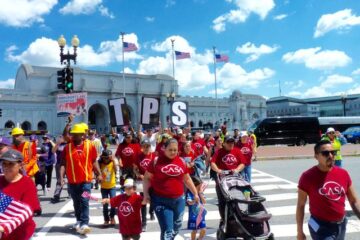
By Jenny Manrique
ARVIN, Calif. — Arelia Sanchez is a tiny woman behind a big eight-month pregnant belly, but her voice speaks volumes. She says she doesn’t hide the fact that she is undocumented, and whenever she can, she reminds everybody that all of her four children were planned.
Every time she has to go to a hospital she demands that a nurse or a doctor talk to her in her native Spanish.
“I am not afraid of anybody pointing at me about my status because I have the right to take care of my family’s health,” said the 32-year-old resident of the city of Arvin, an agricultural community south of Bakersfield, Calif., where the majority of the population is Hispanic — 93 percent according to the 2010 Census.
In Kern County, where Arvin belongs, close to 60 percent of farm workers is undocumented, according to data from the Migration Policy Institute. Most of them work on farms, picking and hauling carrots, almonds, pistachios, grapes, potatoes, peppers, watermelon and other produce.
I met Sanchez among a group of 35 or so immigrants who attended a community forum here at the Veterans Memorial Hall June 28, organized by New America Media in partnership with the Dolores Huerta Foundation. The topic of discussion keeps many of them awake at night: Are they going to lose their access to health care because of the Trump administration’s threat to repeal and replace Obamacare?
“Nothing has changed now. You still can enroll in Medi-Cal (known as Medicaid in the rest of the nation) and there are state and federal laws that protect your information,” said Imelda Plascencia, health policy outreach manager with the Latino Coalition for a Healthy California. Undocumented herself, Plascencia is an enthusiastic community organizer who was on the forefront of efforts to push through key legislation — Health For All Kids — that provides full-scope health coverage through Medi-Cal for even undocumented children in California.
“California is only one of five states that offers such coverage, and our goal is to extend it to undocumented adults,” she told the audience who were clearly eager to find out more about their options for health coverage outside of emergency rooms.
Plascencia also reminded them that “the Dreamers who have DACA (Deferred Action for Childhood Arrivals) are also covered.” Aside from medical coverage through Medi-Cal, “they also have access to mental and dental health services.”
Although children under 19 are covered, adults are not. And Kern is one of the 11 counties in California that hasn’t invested financial resources in any type of public health coverage for undocumented adults. Their option is to get insurance through the workplace or buy private insurance. But that could change if health care advocates have their way.
“We are working closely with the Board of Supervisors because they decide how federal money gets spent,” said Plascencia. “For now, there are some low-cost programs for undocumented adults, and those immigrants who become permanent residents can immediately access federal medical programs without having to wait five years like in other states.”
In Arvin, community clinics like Clinica del Pueblo and Clinica Sierra Vista provide health care for all regardless of their status. Arelia is expecting to have her baby there. She said that during her first two pregnancies, her insurance, Heart Family, covered everything from ultrasounds to medicines after delivery.
“I haven’t had any problem until now,” she said, adding: “But we are afraid to lose Medi-Cal.”
Arelia left behind two children in Veracruz, Mexico, who she has watched grow up via Skype and FaceTime. It is going to be 10 years since she last hugged them. “We are saving money to go back when this baby is a couple of years old,” she said. “I want my family to be together. It’s getting more complicated to bring my older children here.”
Although, according to local police there has been no increase in activity by ICE, rumors of immigration raids have heightened anxiety among residents, some of whom don’t even want to go to the hospital.
“It could be very stressful,” said Teresa Morales, 49. “Without papers, we are exposing ourselves to deportation, and because we don’t have health insurance, we just show up in the hospital when we feel we are about to die,” said the woman who has been struggling with a dental problem for years.
“I have had to pay out of pocket $600 for endodontics and $100 just for removing a tooth,” said Morales, a mother of three, all of whom are covered by Medi-Cal.
Although unauthorized immigrants are not obliged to buy health insurance as citizens are in order to avoid penalties, the loophole for adults in the Medi-Cal coverage forces them to leave their health to chance.
“I work 50 hours a week in the fields and my daily prayer is that I never get sick from the things we are exposed to,” said Morales. In early May in Bakersfield, nearly 50 farmers became sick from a pesticide that the Trump administration has deemed a “chemical safe to use.”
“If one has to stop working, there is of course unemployment insurance… But we will get no health insurance,” Morales said.
Blas Laureano Ventura, 46, used to have insurance through his job, but he lost a finger while operating a vineyard trimming machine. The pain in his left arm is still so acute now that he can’t move heavy things.
“I am at home without receiving any physical therapy,” said the 46-year-old man born in Oaxaca, Mexico. “I pay $50 for an injection to tolerate the pain.”
He is still grateful that with Medi-Cal, one of his kids was able to get treatment for his asthma. His wife also gets treatment for her kidney problems. But that treatment is limited and can only be accessed in emergency rooms.
“I hope Trump doesn’t take away Medi-Cal from us,” he said. “What if one of us gets cancer or diabetes? What would happen to us without health care?”
Source: New America Media



